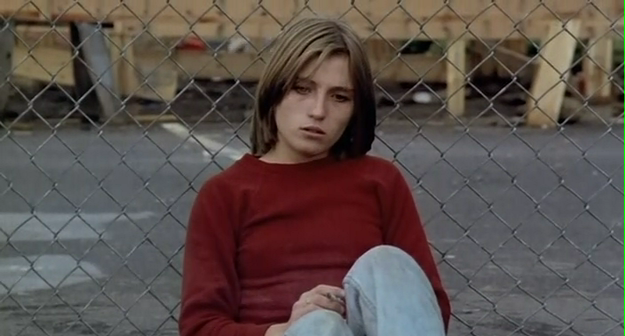From Video Movies (August 1984). -– J.R.
Out of the Blue
(1981), C. Director: Dennis Hopper. With Linda Manz, Dennis Hopper, Sharon Farrell, and Raymond Burr. 94 min. R. Media, $59.95.
When it was released, a friend wittily and succinctly described Out of the Blue as “Dennis Hopper’s Ordinary People.” Though this film didn’t start out as a Hopper movie (he signed on as an actor and took over direction after shooting started), it certainly has the Hopper flavor: relentlessly raunchy and downbeat, and informed throughout by the kind of generational anguish and sense of doom that characterizes both of his earlier films [Easy Rider and The Last Movie].
Hopper, one should recall, is a figure identified with the 1950s. He made his acting debut alongside James Dean in Nicholas Ray’s Rebel Without a Cause (1955). Conceived as a kind of punk remake of Rebel set in a contemporary working-class environment, Out of the Blue centers around Cindy “CeBe” Barnes (Linda Manz), an alienated 15-year-old punk who perpetually mourns the deaths of Elvis Presley and Johnny Rotten. Her mother, Kathy (Sharon Farrell), is a junkie who works at a cheap restaurant; her father, Don (Hopper), is a former trucker and an alcoholic finishing off a five-year stint in prison when the film opens. His crime, which we glimpse in fractured flashbacks, was accidentally driving his truck straight into a school bus while drinking and horsing around with CeBe, killing several schoolchildren in the process. When he is released from prison, Don finds work in a garage dump until the irate parents of one of the slain kids gets him fired; from then on, his descent into self-destruction is as inexorable as the fates of his wife and daughter. By the cataclysmic end of the movie, the bankruptcy of the parents’ 1950 generation virtually metamorphosizes itself into the desperate death wish of CeBe’s burnt-out 1980s mentality.
“Out of the blue and into the black,” goes the plaintive refrain of Neil Young’s theme song. If Hopper’s vision is hopeless, it is not without a yearning sense of life’s possibilities for his doomed family. As an heir –- perhaps the only one among American directors -– of the mantle of Nicholas Ray’s angst-ridden lyricism, Hopper lacks the visual flair of the former, but his work with actors is just as powerful. Think of how he made Jack Nicholson a star in Easy Rider. What Hopper does here with Linda Manz is no less impressive, and the scenes between her and Hopper speak volumes in suggesting affectionate links and unspoken complicities. Hopper’s masochism as a performer/director ensures that the characters he plays are almost never sympathetic; his bombed-out hippie in Apocalypse Now is further proof.
Yet, however pessimistically he carries the mantle of James Dean into the present, Hopper has not lost his ability to show the desire of youth. His deeply compassionate portrait of CeBe proves that his rebels are at least still looking for a cause.
— JONATHAN ROSENBAUM


